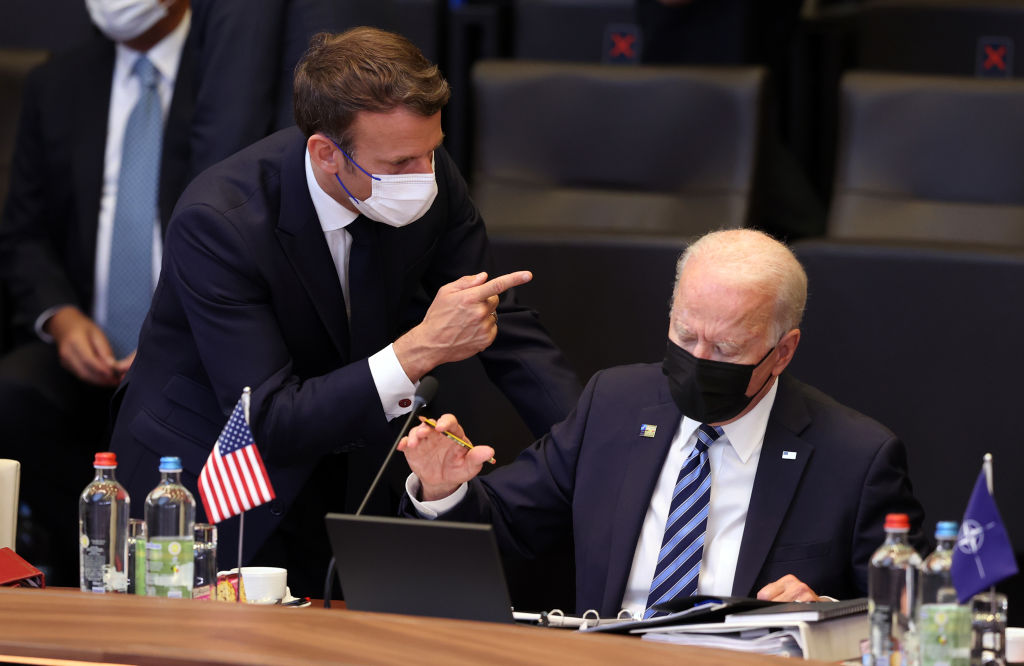AUKUS partners must play catch-up to repair relations with France

Prime Minister Scott Morrison is embroiled in a tussle with both French President Emmanuel Macron and US President Joe Biden which, given the power asymmetries, risks leaving Australia exposed and vulnerable in a major-power league above its paygrade. Across Africa and Asia, variants can be found of the folklore that the grass is trampled both when elephants fight and when they mate. In the Melian Dialogue of the History of the Peloponnesian War by Thucydides, Melos is sternly admonished by Athens that questions of right and justice apply only to relations among equals in power. For others, ‘the strong do what they can and the weak suffer what they must’.
The cancellation of a deal that should never have been signed in the first place was the correct call. Reverse-engineering an advanced nuclear-fuelled submarine into a technologically inferior version with less range, at-sea endurance, stealth and overall lethality, requiring Australia-based workers and facilities, increased the cost and lengthened the timeframe. Morrison has overturned the baffling call to build the Attack-class submarine, aligned the most significant defence acquisition with Australia’s rapidly changed strategic circumstances, and returned to the comforting embrace of tried and trusted allies.
The national-security folly is not therefore in the cancellation of a suboptimal submarine contract, but in the legal void of no existing contract and the operational void of no new submarines for another two decades. The diplomatic folly lay in the transfer of the full burden of the cost and embarrassment of the original error by Australia to France, in the process wrecking a centrepiece of French engagement with the Indo-Pacific region. This cannot but weaken the collective unity and cohesion of the democratic alliance against the multi-faceted challenge posed by China.
That’s the test of diplomacy the AUKUS allies have failed and they must play catch-up to repair the damage. An upgraded Royal Australian Navy can better build back Western military muscle in the Indo-Pacific but the European Union can contribute much more to global finance, trade, infrastructure, health, artificial intelligence and green technologies in a rewired rules-based liberal international order whose control circuits are located mainly in Western capitals. The critically greater importance of France to both the US and the UK means Australia could become the sacrificial lamb in efforts to mollify Macron.
Paul Kelly’s front-page analysis in the print version of The Australian on 3 November was headlined ‘Of course Macron was misled, our PM had no choice’. Kelly frames his argument in terms of two ‘unpalatable’ and irreconcilable ‘realities’: ‘Macron was misled; and Morrison had every reason not to inform him.’ However, in her magisterial account of the outbreak of the World War I, The war that ended peace, Canadian historian Margaret Macmillan ended with the conclusion: ‘there are always choices’. While former prime minister Malcolm Turnbull’s statement that Morrison has a ‘reputation for telling lies’ is a reflection on Turnbull’s unsated bitterness, the measured criticisms from former foreign minister Julie Bishop, former Department of Foreign Affairs and Trade secretary Peter Varghese and onetime deputy secretary John McCarthy are more cutting. With foreign policy decisions ‘more than usually being framed through the prism of domestic politics’ (Varghese), critical relationships risk being badly damaged. Australia’s reputation for reliability and trustworthiness has taken a hit in Europe beyond France.
Cameron Stewart, The Australian’s former correspondent in Washington, has parsed a 15-page confidential record of discussions among the top AUKUS negotiators that outlined in precise detail the sequence of events that would announce the new pact to the world. France was to be informed on the same day, that is, on 16 September, that the existing $90 billion Attack-class deal was being scuttled in favour of nuclear-powered submarines from either the UK or the US. The officials anticipated French surprise and anger but the AUKUS allies badly misjudged the depth of resentment in Macron personally and France nationally. Asked on 31 October if he thought Morrison had been untruthful, Macron replied: ‘I don’t think, I know.’
France matters more to the US than Australia does, by a lot. Hence Biden’s grovelling remarks to Macron at the G20 summit in Rome. ‘We have no older or no more loyal, no more decent ally than France,’ Biden assured Macron while apologising for a graceless and clumsy handling of the issue and saying he thought Paris had been kept informed by Canberra.
It’s possible but unlikely that Biden was not kept fully in the loop or that he has simply forgotten being kept abreast of the need for secrecy to close the deal. The most likely explanation is a cold calculation that France is genuinely affronted. While France is not US-dependent, it’s a critical partner and a lynchpin of US engagement with and in Europe. Australia will have little choice but to swallow hard and accept Washington’s logic.
Major powers like the US, China and France pursue imperial foreign policies, not ethical ones. Australia is being targeted by Xi Jinping, mocked by Macron and been thrown under the bus by Biden.
Repeated reminders from Australians about the soldiers who gave their lives to liberate France are frankly tiresome. Australia did not join World War I to liberate France but to fight alongside Britain, just as the US did not enter World War II to save Australia but because it was attacked by Japan. Lord Palmerston famously said that nations have no permanent enemies and allies, only permanent interests. That is simultaneously the justification for Australia’s change of mind on nuclear submarines and of US attempts to appease France. Australia needs the maturity to understand that this is how the world operates and to work around the realpolitik instead of sulking over it.
